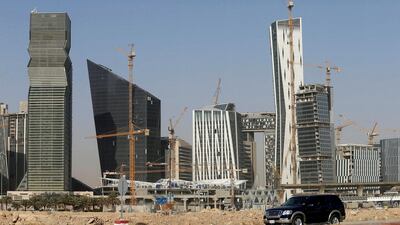Many commentators have claimed that Saudi Arabia’s anti-corruption drive, launched dramatically in early November, has had the unintended consequence of scaring away foreign investors just when the kingdom needs them.
Do those thinking of purchasing assets in Saudi Arabia have grounds for fearing arbitrary expropriation?
The short answer is “no”, and the view circulating from these commentators is a combination of strategic misinformation and ignorance. Let us explore why.
First of all, by way of background, all the Arabian Gulf countries, including Saudi Arabia, have an excellent track record when it comes to respecting property rights, especially of foreigners. This is to be contrasted with the performance of many Middle East republics, as well as lots of other emerging economies, where governments have succumbed to the temptation of seizing domestic, foreign-owned assets.
For example, as recently as 2012, Spain accused Argentina of expropriating its oil company, YPF, while the Gulf oil companies were all nationalised in a manner acceptable to the original owners. The is why countries like Bahrain and the UAE have been able to attract large amounts of foreign capital over the past 20 years.
However, it is fair to say that the actions of the Saudi government in early November were shocking and represented a seismic change in the way the country is run, necessitating a close examination by investors. When you search for what conclusions these investors have arrived at, ask yourself two questions.
First, does the person expressing the opinion have an incentive to deliver accurate information?
Second, does the person expressing the opinion have the knowledge required to deliver accurate information?
Let us start with the easiest corner in this matrix: people who know what they are talking about and have an incentive to tell the truth. The most salient occupant of this quadrant are international credit rating agencies - who dedicate their efforts to this task and whose livelihood depends upon it. None of the three major ones (Moody’s, S&P, Fitch) have changed Saudi Arabia’s rating. In fact, S&P issued an update in late November where they affirmed the A/A2 rating, with a stable outlook, and the focus of the report was fiscal consolidation. They even remarked that the reforms “could empower Saudi citizens and make Saudi Arabia more attractive to investors over the medium term”.
What about people who deliberately try to mislead the general public? In the case of Saudi investment, there are two types who fall into this category.
___________
Read more:
Economics 101: Contribution of Muslim economists needs greater acknowledgement
Economics 101: research studies are not easily swayed by conflict of interests
___________
First, actual investors. If you have discovered a good investment - especially one where the opportunity to invest will soon be available but isn’t yet officially open - then is it a good idea to tell everyone about this great investment? Actually, you want to do the precise opposite, to drive prices down. Once you have made your investment, you are happy for others to join on, but Aramco, Neom, and other projects are not yet open for business. So if a journalist contacts one of these experts, it’s absolutely in their incentive to talk negatively.
Naturally, there are experts who are prepared to professionally convey what credit agencies report, but they have little incentive to harry media outlets into interviewing them, and their basic “business as usual” view is unattractive to readers and viewers - and therefore to media editors.
Second, people who dislike Saudi Arabia. Geo-politically, the kingdom has as many friends as foes, so we can assume that they about cancel each other out. But normal journalists - who tend to lean left politically - dislike Saudi Arabia for three reasons: it’s a monarchy; clerics have historically had a strong role in government and society; and many (mistakenly) liken the kingdom’s oil wealth to an aristocrat’s “unearned” inheritance. It’s basically a dystopia for 18th century French politician Maximilien Robbespiere. Thus, such journalists’ default propensity is to write negatively about Saudi Arabia, and it’s not hard to see hyperbolic examples in the media on a daily basis. This is exacerbated by the general currents of Islamophobia and racism among readers and viewers that adversely affect the coverage of any Middle East country.
That leaves uninformed but well-intentioned reporters. They take their lead from the aforementioned experts or from their colleagues who express conviction, both of which tends to push them in the direction of negative coverage, too.
We shouldn’t be too dismissive of scepticism about investment in Saudi Arabia, however, as the global financial crisis of 2007 shows that credit rating agencies are capable of spectacular errors.
But you should remind yourself that successful investors do not get their ideas watching experts ruminate on satellite news channels: by the time they have reached the morning news, “hot tips” are typically useless. The stakes in investment are so high, and financial assets can be transferred so quickly, that mainstream media is a uniquely terrible source of information about the investment-worthiness of a particular stock, bond, or country.
Basic conflicts of interest mean that asking Warren Buffet to comment on the Aramco IPO will always be more precarious than asking Pele to comment on the future star of the Brazilian football team.
Omar Al-Ubaydli (@omareconomics) is a researcher at Derasat, Bahrain.


